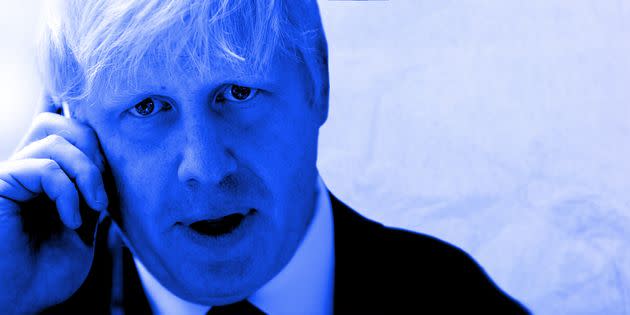Analysis: Despite Everything, Could Boris Johnson Actually Survive?

Ever since details first emerged about the alleged lockdown-busting parties in Downing Street, Boris Johnson has seemed like a dead man walking.
A constant drip feed of revelations, alongside a steady stream of Conservative MPs publicly demanding that he go, made it look as though his departure from No. 10 was inevitable.
But despite everything that’s been thrown at him, Johnson remains in post, a situation which is unlikely to change in the short-term.
HuffPost UK has spoken to MPs from across the Conservative Party to assess what could happen next and whether, against all the odds, Johnson could yet lead them into the next general election.
How it all started: partygate spoils Johnson’s party
As recently as October, the PM seemed unassailable. The Tories were ahead in the polls and there was even talk of an early election to hammer home the party’s advantage.
Then, in November, came partygate. The Daily Mirror reported that parties had taken pace in Downing Street around Christmas 2020, in breach of the lockdown rules at the time.
Johnson insisted that all the rules had been observed at all times, but this defence quickly crumbled as more evidence emerged of gatherings in and around No. 10 — including a birthday party, with cake, for the PM himself in June 2020.
The endless negative headlines, and the prime minister’s failure to get a grip of the crisis, have seen Labour take a commanding poll lead. Many Tories, who only won their seats with narrow majorities in 2019, are understandably nervous about their job prospects.
One, Christian Wakeford, even took the extraordinary step of defecting to the Labour Party in protest.
A report into partygate by senior civil servant Sue Gray blamed “failures of leadership and judgment” for the scandal, infuriating Tory MPs. Their mood darkened further when, in his Commons response to the report, Johnson wrongfully accused Keir Starmer of letting Jimmy Savile escape justice when he was Director of Public Prosecutions.
A flurry of letters of no confidence in the PM were submitted to 1922 committee chairman Graham Brady as more MPs broke cover demanding he resign. A total of 54 are needed to trigger a vote of no confidence, but informed sources believe we are still some way short of that tally.
The result is a sense of inertia while we wait for the Metropolitan Police — who launched their own investigation into the partygate affair — to disclose the result of their own probe.

Johnson had until 10pm last night to return a questionnaire he was sent by the Met a week ago asking him to set out his own involvement in the scandal — raising the incredible prospect of the PM being fined for breaking the very rules his government imposed.
Gray will also publish her full report once the Met have completed their own inquiries.
Disunited tribes buy time
Disaffection with Johnson, although widespread, is scattered across various tribes rather than concentrated in one group willing and powerful enough to move against him.
When Theresa May was forced to undergo a no-confidence vote at the end of 2018, there was no doubt who was behind it.
The European Research Group (ERG), spearheaded by the likes of Jacob Rees-Mogg, publicly agitated against May over a Brexit deal they could not support.
But with Johnson, his opponents span right wing MPs opposed to tax rises and state intervention, to moderates put out by what they see as the PM’s lack of moral leadership.
Meanwhile, a generational divide — starkly illustrated by the Owen Paterson lobbying scandal — has prevented much plotting between the 2019 Tory intake and their older colleagues.
The result is a stalemate situation, where MPs are opting to “wait and see” what comes next before deciding whether or not to make their unhappiness known.
One senior Tory MP told HuffPost UK: “I think it’s very brave of those putting their heads above the parapet but I think it’s premature.
“I’m waiting to see if he misled parliament — that will be the line for me. I won’t be able to support him after that.”
One grandee offered a more philosophical explanation.
The source said the Conservatives’ reputation for ruthlessness had been exaggerated, citing the failure to remove John Major from office before the 1997 election, and more recently, May, who staggered on for a year before she was finally ousted.
“The Tory party is not the ruthless dispatching machine that it’s cracked up to be,” they said.
“The primary driver is that individual MPs are very cautious about putting in letters for good and bad reasons — good reasons of loyalty built into the party, bad reasons of fear that if they put a letter in it will get found out and they won’t get promoted.
“Then there are others who are calculating that it’s too soon because he might win the no confidence vote.
“All these things build together so that people really want to put it off and put it off, so they pick a date in the future such as when the full Sue Gray report is out.
“It’s a slow motion thing because it’s not organised.”
What may well speed up Johnson’s demise is if he receives a fine from Scotland Yard.
“If he gets fined, he’s broken the law and he cannot be prime minister,” one backbencher said emphatically. “That tips him over the edge.”
Another disagreed. “The only rule is that if you lie to the House then you have to resign,” one MP said.
“The truth is, he has lied to the House, and everybody knows he has, and he hasn’t resigned and there’s been no motion to remove him.
“I don’t think any of these rules really apply.”
Succession woes
Another factor buying Johnson time is the lack of an obvious successor who Conservative MPs can rally round.
Chancellor Rishi Sunak and foreign secretary Liz Truss are the two frontrunners, but there are major doubts about both of them among their colleagues.
“The press like Rishi, but a lot of people are worried about his tax policies,” one MP said.
“Others like Liz Truss, but a lot of people are not sure she is capable of doing the job — she channels Margaret Thatcher but she’s not nearly as clever.”
Another disagreed that divisions over who should take over were keeping Johnson in place.
“I’ve heard plenty people say they don’t care who takes over as long as he is gone,” they said.

“As long as they have got honesty and integrity, they’ll welcome the policy stuff later on.
“I think Liz has the right instincts, she’s got the right level of experience and is the longest-serving member of the Cabinet.”
Another backbencher added: “I’m ideologically closer to Liz, but I worry that post-Boris, what the country wants is a period of calm, and that would be more Rishi’s approach.
“I’m seeing an ideology I quite like in somebody who’s a bit more rambunctious and a steadiness that I quite like in somebody who I worry is a bit technocratic.”
The bite of the ballot box
If it’s not a fine over rule-breaking or giving misleading statements to the House, could the power of the ballot box break Johnson, just as it made him?
Voters will go to the polls in May in another set of local elections across parts of England, all of Scotland and all of Wales, providing a valuable litmus test for how the country feels about its governing party.
“If I extrapolate what I’m hearing on the doorstep, I think the Conservative party is going to lose a hell of a lot of councillors in May,” one MP said.
“You’ve got a lot of colleagues in the north who are saying their voters love him, but they’re going into the comfort zones. If you go into the core vote, it’s very very bad.
“The 2019ers are scared to lose their seats, but if they have a shit set of council elections, that will wake them up.”
Don’t blink first
As improbable as it may seem, there is a decent chance that Johnson could yet hang on to his job.
Should he avoid a police fine, that will be enough to persuade some MPs not to move against him. Others still cling to the belief that the election-winning machine who twice enjoyed victory in Labour London, delivered Brexit and an 80-seat majority could yet come good again.
One MP summed up the Tory dilemma when they said they were “pretty uncomfortable” with what had happened, but added: “I’m not in the first, second, third cohort of people who are going to call [for his resignation].
“I’m quite far down the path in terms of when I’m going to start doing things myself.
“So ultimately, it’s going to be down to other people in the party about whether they want to force that choice.”
As long as there are enough of his backbenchers with the same view, Johnson is secure.
This article originally appeared on HuffPost UK and has been updated.

 Yahoo Sports
Yahoo Sports 